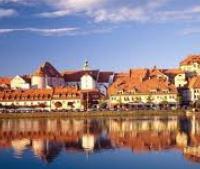
Anand Won the Toughest Match in his Life
When I posted my first article for chess.com about a week ago, a wise reader criticized me for the mild title- minimal advantage for Anand. A whole point advance and the opportunity to start the second half with the white pieces- this sounded really too difficult for Topalov. However the course of the fifth and sixth games indicated that the match is going for a turning point.
In the seventh game the Bulgarian Grandmaster applied an excellent novelty as black. He first sacrificed an exchange then a piece.
He avoided the three-time repetition on a few occasions and kept the initiative throughout the greater part of the game. However Anand defended extremely well and even played for a win in the endgame. The final outcome was a draw and a moral victory for the challenger.
The eighth game saw Topalov leveling the score. Anand chose again the “Slav wall” but it seemed that such passivity is not to his taste. He tried to solve the problems actively but missed a tactical detail and ended up in trouble. Topalov kept on pressing despite his opponent’s brilliant defense. The Bulgarian’s stubbornness as well as his will for a positive outcome bore fruits as Anand blundered in an objectively equal position.
The ninth game saw Anand in complete command, and he missed clear wins on several occasions.
This time it was Topalov who showed coolness and resourcefulness in a position which many would simply discard thus saving a critical half point. At the press conference after the game the World Champion seemed exhausted and desperate.
White seized the initiative in the next game and it was Topalov’s turn to miss a good opportunity to take the lead:
The course of the battle spelled the worst for the many supporters of Anand. The last but one game though came as an indication that he has no intention at all to give up. In a position in which almost everyone would settle for a move repetition (especially if we take into account that an eventual loss would practically decide the outcome of the match) Anand came up with an extremely risky and aggressive plan:
The opening stage of the final game did not bode storms. Topalov had the better pawn structure while Anand was compensating with active piece play. Things tended to lead to a draw when the Bulgarian decided to play all in. The way that he did it though resembles the ritual suicides:
Veselin lost the game and the match. The reason for his overaggressive play for a win appeared to be fatalism. The Bulgarian was afraid to play the rapid games on the date of the thirteenth as he had lost his title in Elista on precisely the same date.
The match appeared to be extremely exciting and unpredictable and Anand called it “The toughest in my life.” There were no major mistakes (if we exclude the final game) and not a single short draw. Both Grandmasters entertained the chess world with uncompromising and full-blooded fighting.
Unfortunately in a match a draw is an impossible result, and there can be only a winner and a loser. Veselin Topalov lost the match but he can continue with his head up. His phenomenal ambition to take the maximum from any position and his will to fight till the last pawn raises the image of the game all over the world. Thanks to him small Bulgaria hosted three super-tournaments, semi-final and final matches for the World Championship- events that we could have only dreamed of in the past. And most probably there are more to come.
Viswanathan Anand won in a close fight. The Indian proved that he is not only a universal super-player but that he is a super-athlete with nerves of steel and tremendous will. In the decisive last two games he remained true to his style.
Apart from him those who profited were the millions of chess admirers all over the world. I can only wish to see many more matches like this one in the future!

